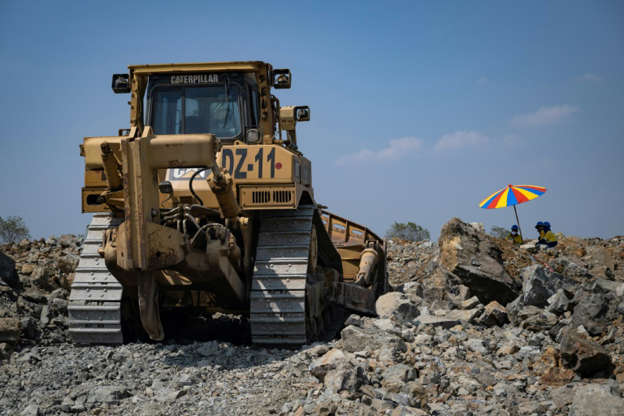Khao Chet Luk: Thursday marked the reopening of a controversial gold mine in Thailand, more than six years after the government ordered its closure due to health and environmental concerns.
The Chatree complex, which spans three rural provinces in the north of the kingdom, had been plagued by legal disputes and villagers’ demonstrations alleging that it poisoned crops and livestock.
In May 2016, the Thai government, which was a military junta at the time, ordered the open-cut mine to cease operations, marking a rare victory for environmental activists.
Kingsgate Consolidated, the Australian proprietor of the mine, initiated arbitration proceedings seeking hundreds of millions of dollars in compensation but, following negotiations, the government agreed to enable the reopening last year.
The mine, which is administered by the Thai subsidiary of Akara Resources and is touted by its proprietors as the largest in Thailand, discharged its first bars of gold-silver alloy on Thursday, using ore stockpiled in 2016.
Rob Kinnaird, the mining manager for Akara Resources, stated that the reopening would be beneficial for the region.
“It means we can expand and hire more individuals. There are additional opportunities to assist the local communities by investing in their means of subsistence, he told AFP at the mine.
Its current workforce of 280 could more than double within the next few years.
The reopening coincided with the first time in a year that the gold price reached $2,000 per ounce.
– Cyanide, arsenic –
Prior to a decade ago, the discovery of elevated levels of heavy metals, including arsenic, manganese, and cyanide, in the blood of some villagers sparked widespread alarm in neighboring communities.
The mine denied liability, claiming that arsenic and manganese were naturally occurring in the area.
At the time, Thailand’s minister of industry stated that an investigation could not conclusively connect villagers’ health complaints to the mine, but recommended its closure for the “good of society.”
The mine, located approximately 280 kilometers (170 miles) north of Bangkok, was a major economic factor in an impoverished rural area, employing 1,000 people directly.
According to rehired employees, losing their employment was devastating. Many were compelled to leave their children with grandparents in order to seek employment in distant locations, while a large number of small businesses closed.
Chalita Kongpradab, a senior human resources officer at Akara, was expectant when she was laid off and forced to survive as a fish and noodle vendor.
“It scarcely assisted me in surviving. “On occasion, I could only sell one bowl of noodles,” she sobbed.
Community financing
Despite the fact that many in the region appreciate the economic boost, some anonymously told AFP that they are still concerned about chemicals and metals.
Others were concerned about the effects of explosion noise and particulates on respiratory health.
59-year-old Dao Seehawatr said, “I’d like to see the people who live near the mine, like me, relocated first.”
Kinnaird stated that the company would be more responsive and would closely monitor pollution, dust, and the health of residents.
In 2015, Thai scholar Nattavud Pimpa described the mine as a “lesson in failed community management.” This week, he told AFP that there were indications the company had “learned to deeply engage with the community.”
Also read: Kitty O’Neil is 77 years old today
Cherdsak Utha-aroon, general manager of sustainability for Akara, stated that some royalties would be allocated to a community support fund and a health monitoring program.
Between 2001 and 2017, Chatree produced more than 1,8 million ounces of gold and nine million ounces of silver.




